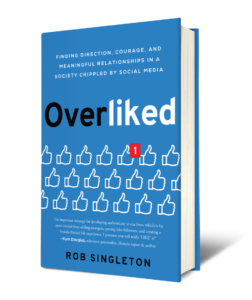I’m sure we have all seen an “Instagram influencer” at some point, always looking their best and crediting part of it to some new tea, amazing workout product, or the latest gizmo. Whenever you see what they have, doesn’t it make you want it too? Even just a little bit? Well, that’s their job, and they’re usually pretty good at it. Their job as an “influencer” is to influence their audience (AKA, you, me, your friend, maybe even your grandmother) that whatever they have, we need.
Crazy how powerful influence can be, isn’t it? That’s what so many companies bank on, actually. They count on social media to bring in sales by making us feel that they have something we need, and we won’t be content without it.
This is not a new thing. Advertisers know that “image is everything.” For years, actors in white lab coats announced in cigarette ads that doctors endorsed smoking. It was decades before smokers who’d been duped into believing those advertising lies were able to sue tobacco companies, after some 130,000 people died each year from smoking-related causes.
These past few Mondays, I’ve been sharing about optics. Today, I want to go deeper and discuss optics and the real you.
Be Careful What You Believe
Believing an image can be deadly—like the cigarette ads of the 60s—and yet, for many people, “image is everything” remains true. The image seems more important than reality. Consider some areas where perception has replaced reality:
- Appearing as if we’re having a good day is more important than admitting when we need help.
- Feelings are more important than facts.
- Political correctness is more important—and believable—than truth.
- Ideology is more important than history.
- Spin is more important than accuracy.
- Group identity is more important than who you actually are.
- Readership is more important than correct reporting.
We have become a nation where the optics of everything trumps the reality of anything. In so many ways, our own feelings of self-worth are directly tied to the way others perceive us. No wonder we try so hard to “spin” our own lives.
How Do You Know What Your Optics Are?
Optics have been used to spin war results and gloss over character flaws. They’ve been used to hide mistakes and mask failures. They’ve even been used to change school textbooks and completely rewrite history. It sounds as if I’m blaming government and big business for those things. But I’m not. Read it again. This is how we all use optics today—for the everyday living of our own lives.

Social media loves optics. You may have never put up a truly spontaneous photo of yourself and your friends without checking several shots of the exact same thing first and getting everyone’s approval on how they looked. You may have never tweeted your real feelings without couching it in political correctness. And you may have posted something only after it was edited, deleted, reposted, edited again, until finally you achieved your own stamp of approval—approving yourself for being yourself.
The truth is: none of us is perfect. So why do we try to present ourselves that way? Admitting our weaknesses is not doubt or fear. It goes back to the original meaning of optics—seeing ourselves for who we really are.
Honesty sets us up for authentic relationships. Being genuine invites truth and clarity into our lives. Dishonesty does the opposite. When we pretend we are perfect, we deny our need for help. Instead of our transparency, our “weakness” becoming our strength, our faked “strength” becomes our weakness.
Perfection isn’t a #goal…it’s an #impossibility. When we insist on building the illusion that we have life under control, all amazing and perfect, we barricade ourselves from getting the help we need.
Deep down, don’t we all want what is real? And authentic? How long can we live with the spin? And how long before the optics wear off and the world sees you for you?
The Real You
Expectations placed on people have never been higher than today. For women, the expectation often focuses on appearance over accomplishment. In one recent 12-month period, YouTube logged 169 billion views just for beauty-related content alone.
This culture of expectation and perfection prompted singer-songwriter Colbie Caillat to release “Try,” an anthem about authenticity. The thought-provoking song poked holes in the optics of fashion and the unrealistic expectations placed on women. In her lyrics, Caillat invited women to reveal their true selves by taking their makeup off, letting their hair down, and embracing their natural beauty. It was an anti-super-you anthem.
To answer her own lyrics, Caillat started her music video in full makeup and, verse by verse, shed the optics. Off came her hair extensions. Then her fake eyelashes. Then the truckloads of eyeliner, shadow, and mascara. By the song’s end, stripped down to her natural beauty, she basically asks the listener, “Do you like yourself?” It can be a hard question to answer.
Do you like yourself? Good question. It seems we are buying in to optics, heart and soul, not just because we’re not sure if the world likes us but because…we are not sure we even like ourselves.
For most of us, when we think of ourselves without our self-made optics, all we see is “Big Head Little Body.” When we look at our shortcomings and mistakes, we tend to resign ourselves to where we are. Our thoughts and beliefs about ourselves reveal our secret fears. What our family members said on their worst day—and probably didn’t even mean—lingers. I’ll never succeed. My best efforts are too little, too late. I can never be enough on my own. There is no hope.
As a result, we’d rather have the fake optics than the harsh reality of what we feel about ourselves. We buy in to the promise of optics because our messed-up lives and the truth of how we really feel about ourselves hurts too much. We know our own failures and inadequacies. We want others to have a better perception of us than we have of ourselves.
Too often, we take stock of our own negative words and give up in despair. We think our problems are painfully apparent, and our failures are agonizingly obvious. We feel they’ll keep us from the authentic relationships and life-giving connections we are longing for.

As a result, we file our dreams under “fairy tales.” We are who we are, the worst of what we tell ourselves, and we fear nothing can change that. Yet, deep in our souls, we are hoping beyond hope…for hope.
So, what do we do with our weaknesses? How do we react to the fact that we are flawed, and our flaws seem to be disqualifying us from our dreams? Next Monday, I will introduce you to a freeing principle called Opposite Day. It’s pretty cool.
If you want to learn more about living a more authentic life, free from the strangleholds and added weight of optic, I encourage you to grab a copy of my upcoming book, Overliked: Finding Direction, Courage, and Meaningful Relationships in a Society Crippled by Social Media, where you’ll find ways to get beyond the optics to the freedom that authenticity brings. (And if you pre-order now, you can immediately download some pretty cool free bonus gifts.)
Until next time, remember that God, the Creator of all things, created you to be uniquely you…flaws and all.
~ Pastor Rob
AKA P-RO
